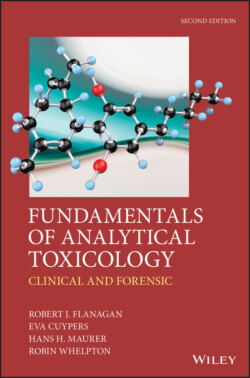Читать книгу Fundamentals of Analytical Toxicology - Robin Whelpton - Страница 69
2.3.15 Other tissues
ОглавлениеOther tissue samples may be useful when investigating deaths where volatile substances such as solvents or gases are implicated. Brain, subcutaneous fat, lung (apex), spleen, and kidney are the most useful; 10–20 g wet weight of unpreserved tissue should be collected into separate containers. The specimen should be placed in a specimen jar or nylon bag (VSA- or anaesthetic-related deaths), taking care not to overfill sample containers, and stored at –20 °C or below prior to and during transport to the laboratory.
Measurement of brain concentrations of certain poisons may be useful in specific instances, for example such measurements are said to be helpful when investigating possible cocaine-related deaths. Spleen is rich in erythrocytes and hence may provide a valuable alternative specimen in which to measure carboxyhaemoglobin saturation if blood is not available (Vreman et al., 2006).
